Guinea pigs, when looked after well, are usually hardy little animals who will usually live for 4-6 years, although some have been reported to get well into their teens. As with any animal they can get sick, and there are a few problems that guinea pig vets realise are reasonably common.
Mites
Mites are a common cause of skin problems in guinea pigs. These cause irritation, itchiness, fur loss, and guinea pigs can even tear their own skin while scratching. In some cases, they can even cause your guinea pig to seizure while they are furiously scratching. Guinea pig vets closely examine the skin and use skin scrapings to find and diagnose the mites.
These parasites can be found on most guinea pigs at any (or all) the time, having been infected by their mother soon after birth. They only become a clinical problem when the pig is stressed or on a poor diet.
Treatment is using insecticides applied to skin every two weeks for three treatments. Stress, diet, and health need to be managed at the same time. Your guinea pig vet is the best person to assist and advise you on both the mite problem and ongoing care and attention.
Dental disease
Guinea pigs have both continuously growing incisors (front teeth) and molars (chewing or cheek teeth). This continual growth allows them to eat fibrous and abrasive foods in their natural environment, while the anatomical placement of the teeth and their circular chewing motion causes each side to wear down its apposing side, keeping everything in good balance. However, if this balance is disrupted, then ongoing problems can occur.
Causes of dental disease
There are several causes of dental disease, which may occur on their own or together:
- Insufficient fibre/abrasiveness in the diet. Low fibre diets require less chewing, which leads to inadequate wear on the continually growing molar teeth. These teeth then develop crown overgrowth, which alters the guinea pig’s chewing movement and can eventually lead to changes in tooth alignment.
- Healthy bones require calcium, vitamin D, and ultraviolet light to stay strong. Guinea pigs with inadequate access to sunlight, or on diets with low calcium and vitamin D, will develop softening of the bones, often known as metabolic bone disease. Normal chewing pressure can then cause the tooth alignment to alter, leading to dental disease.
- Just as sailors a few centuries ago developed scurvy from not eating fruit on long ocean voyages, guinea pigs can develop scurvy if their diet is deficient in vitamin C. Like those sailors, guinea pigs not getting enough vitamin C supplementation will have their hair fall out, the joints become swollen, and their teeth loosen in their sockets.
- Some strains of guinea pigs appear to develop dental disease much more commonly than others, either through poor bone structure or abnormally positioned teeth. There may be a hereditary element to dental disease.
Clinical signs of dental disease
Guinea pigs with dental disease:
- May be extremely interested in their food but still reluctant to eat.
- May drop food while chewing, refuse harder foods, or have difficulty chewing and swallowing.
- Often dribble saliva, matting their fur on the chin and neck (‘slobbers’)
- Usually lose weight.
- May have diarrhoea or constipation.
- Often become weak and lethargic, as it is often very painful.
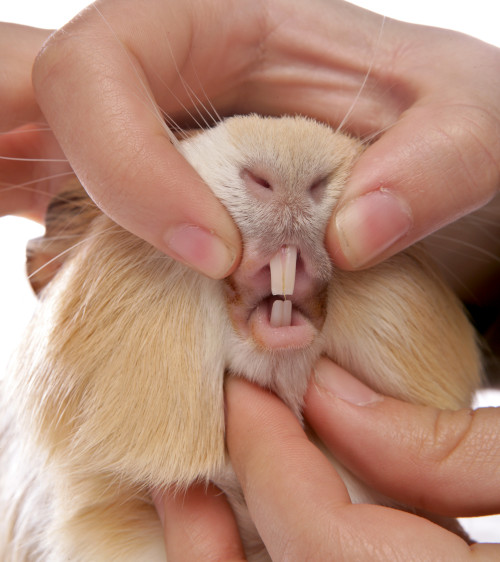
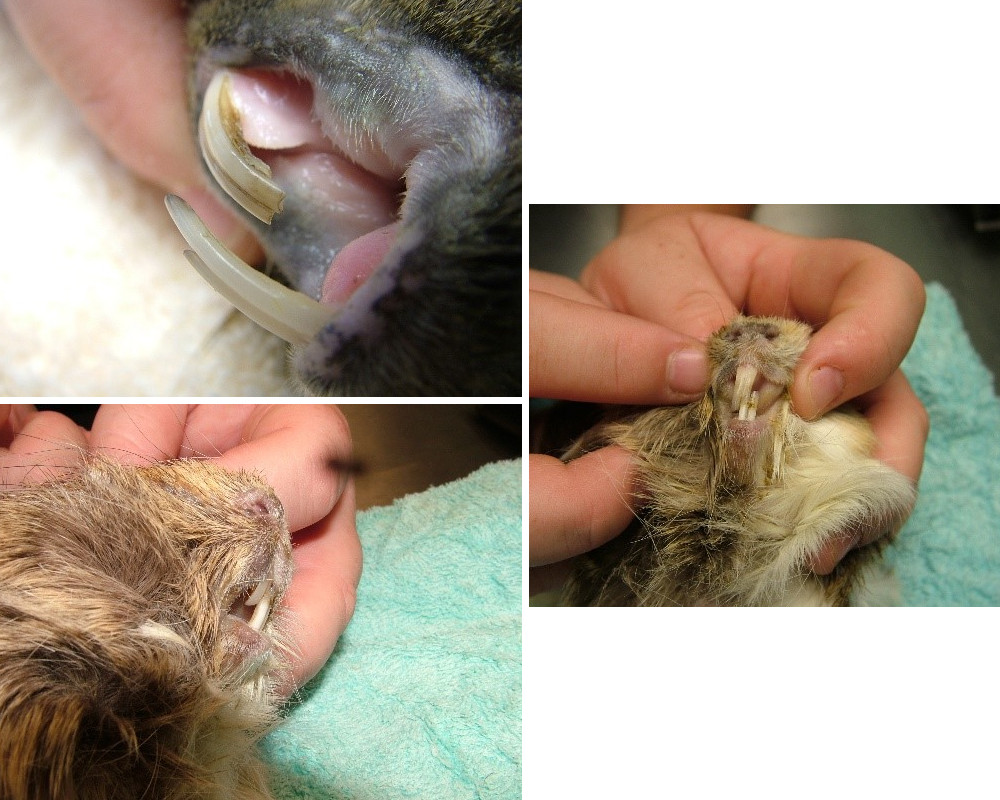
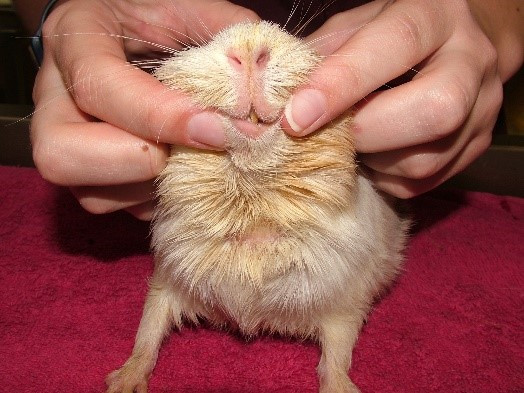
Treatment
Treatment can be long, complicated, and expensive. You will need to see your guinea pig vet as soon as possible, before changes in the teeth and jaw are permanent.
Prevention
Feed your guinea pig a healthy diet and make they get some sunlight for at least a few hours each week.
Bumblefoot (pododermatitis)
Bumblefoot is an infection in the sole of the foot. Initially it starts off as slight reddening and swelling of the area, but it can progress rapidly into a large, scabbed wound with infection involving the joints and bones of the feet.
It is caused by a perfect storm of 1) scurvy, 2) poor hygiene in the enclosure, 3) overgrown nails, and 4) wire-floored cages. These all work together to break the skin on the foot pad, introduce infection, and then stop the guinea pig from healing by themselves.
You will need to see your guinea pig vet to assess the severity of the condition and work up an effective treatment plan with you.
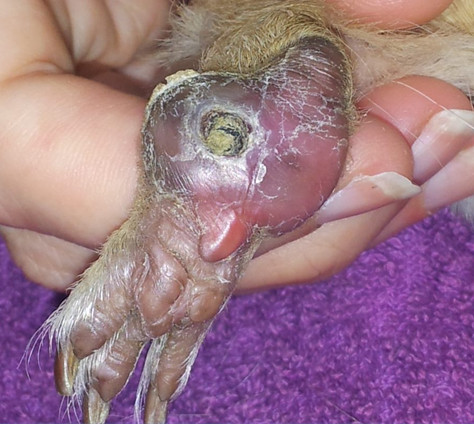
Ovarian cysts
Nearly all female guinea pigs who have not been desexed will develop ovarian cysts by the time they are 3-4 years old. Fortunately, most are non-functional and only become a problem if they are very large. However, a small number (25%) are functional cysts, producing hormones that cause hair loss, skin changes, and changes to the uterus that can become cancerous.
The best prevention is desexing.
Lumps and bumps
Lumps and bumps in, on or under the skin of guinea pigs can be due to abscesses or cancer.
Abscesses are relatively common and are usually associated with fighting. As such, they are usually found on the head and limbs. They contain thick, cheese-like pus that does not drain well just by lancing it.
A different type of abscess seen in guinea pigs is cervical lymphadenitis. This is abscessation of the cervical lymph nodes in the neck, often the result of an infected abrasion of the mouth. These abscesses can be very large and may interfere with breathing and swallowing.
Surgical removal of the abscess or lymph node is the best treatment.
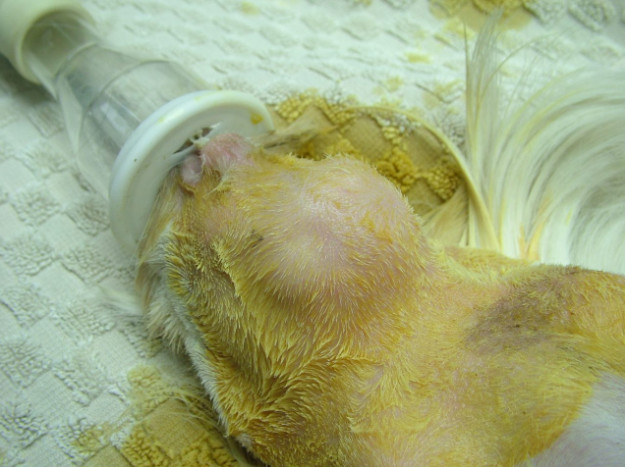
The most common cancer affecting the skin of guinea pigs is the trichofolliculoma (hair follicle tumour), a benign tumour of hair follicles. They appear as solid or cystic dome-shaped nodules with a central depression or opening, usually on the back near the rump. As they are not locally invasive, do not metastasise (spread to other organs and tissues), and rarely recur after surgical removal, the prognosis is good with surgical removal.
References
Baron H (2019) Evaluating treatment outcomes and risk factors for Guinea Pigs (Cavia Porcellus) with dental disease in Australia. Australian Veterinary Association Conference
De Matos R, Kalivoda K (2013) Dermatoses of exotic small mammals. In: Miller W, Griffin C, Campbell K (eds) Muller and Kirk’s Small Animal Dermatology, 7th edition. WB Saunders Co, Philadelphia, PA, pp 1430–1439
Hoppmann E, Barron H (2007) Rodent dermatology. J Exot Pet Med 16:238–255
